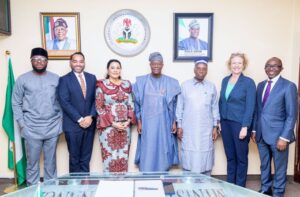

Alternative building materials to cut costs, boost housing affordability — NBRRI
By Esther Agbo
The Director of Consultancy & Executive Services at the Nigerian Building and Road Research Institute (NBRRI), Makava David, has revealed that using alternative building materials like bricks and laterite can reduce housing construction costs by 25 to 30 percent, making homeownership more attainable for Nigerians.
He announced this over the weekend in Calabar following a presentation at the Cross River State Ministry of Housing. The presentation detailed NBRRI’s partnership with the Regional Sustainable Energy Centre of Excellence for Sub-Saharan Africa to initiate a 3,000-unit low-cost housing scheme across the state’s three senatorial districts, with backing from international agencies and local banks.
Speaking to journalists after the presentation, Mr. David stated that the use of alternative building materials would make houses much more affordable for the average person.
He said, “The cost of materials now is on the high side, the technology that NBRRI is bringing is mainly the use of locally sourced material used in building houses .
“We will use clay for the blocks, fibre for the roofing sheets and this will practically bring down the cost of the building up to 25 to 30 percent compared to conventional building material.
“The aesthetics is next to none, when it’s cold outside it’s warm inside and when it is hot outside it’s cool inside, that is why we are bringing this technology to the good people of Cross River with a payment period of 30 years, so that our people can have affordable houses they can call their home.
“Our target and the mandate of the consultant is to provide 3,000 units of low cost housing units in the three Senatorial districts of the state, and it takes less time to build once the materials are in place.”
Cross Rivers Commissioner for Housing, Dr. Beatrice Igwe, expressed government support for the initiative, highlighting Governor Bassey Otu’s commitment to projects that improve living standards. She lauded the tripartite meeting as a significant step towards reducing the state’s housing challenges by providing affordable, quality housing.
She noted, “The tripartite meeting you just witnessed is the birthing of a project that can reduce the housing challenges of the people of Cross River with a view to giving them modest and affordable housing.
“Alternative building materials are the future and the way forward. The presentation we have witnessed has shown that if properly executed there will be progress as well as a boost in the availability of low cost housing in the state.
“I can assure the partners , and other stakeholders that our Governor who has always put the people first , will key into any programme that will alleviate the suffering of the people and improve their living standard.
“I believe he will surely key into any good program that will make life comfortable for the common CrossRiverian.”
Project facilitator Sir Clay Ogeh Ekpong noted the state’s housing deficit, which prompted the outreach to both foreign and local partners to initiate low-cost housing estates.
He praised Governor Bassey Otu, describing him as a people-friendly leader, for his full support and commitment to the housing scheme.
Ekpong emphasised that the project aligns with the governor’s vision of providing homes for Cross River residents, significantly reducing housing challenges. He stated that plans are underway to construct 1,000 bungalows each in Odukpani, Ikom, and Ogoja/Yala local government areas.
Additionally, the CEO of RSECESSA, Dr. Ibrahim Aminu, expressed enthusiasm and anticipation for the project’s start.
CEO of RSECESSA, Dr. Ibrahim Aminu, expressed enthusiasm for the project’s commencement, noting that it aims to deliver affordable, high-quality housing without financial strain on buyers. The broader program targets building one million houses across Nigeria and the FCT, in partnership with NBRRI.
Aminu stated, “The partners have already put plans in motion to make the project a reality, the idea of reducing the challenges of housing is one aspect and then using alternative materials to build is another major aspect with a view of giving the people quality for their money without breaking the bank.
“We want to ensure that we bring affordable housing to our people and make sure they can also pay for these houses with ease and no pressures, and after retirement they can own good houses at the end of the day.”




